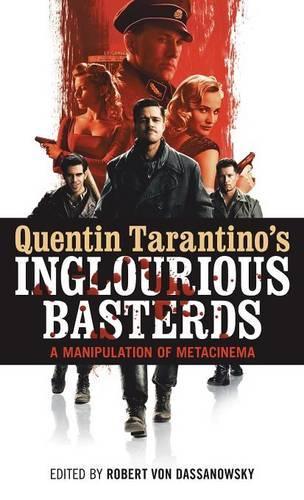
Quentin Tarantino's Inglourious Basterds: A Manipulation of Metacinema
(Hardback)
Available Formats
Publishing Details
Quentin Tarantino's Inglourious Basterds: A Manipulation of Metacinema
By (Author) Professor or Dr. Robert von Dassanowsky
Continuum Publishing Corporation
Continuum Publishing Corporation
30th August 2012
United States
Classifications
Tertiary Education
Non Fiction
Individual film directors, film-makers
European history
791.4372
Physical Properties
Hardback
272
Width 138mm, Height 216mm
592g
Description
This provocative and unique anthology analyzes Quentin Tarantino's controversial Inglourious Basterds in the contexts of cinema, cultural, gender, and historical studies. The film and its ideology is dissected by a range of scholars and writers who take on the director's manipulation of metacinema, Nazisploitation, ethnic stereotyping, gender roles, allohistoricism, geopolitics, philosophy, language, and memory. In this collection, the eroticism of the club-swinging and avenging "Bear Jew," the dashed heroism of the "role-playing" French and German females, the patriotic fools and pawns, the amoral yokel, Lieutenant Aldo Raine, and the cosmopolitan, but psychopathic Colonel Landa, are understood for their true functions in what has become an iconoclastic pop-culture phenomenon and one of the classics of early twenty-first century American cinema. Additionally, the book examines the use of "foreign" languages (subverting English and image), the allegory of Austria's identity in the war, and the particularly French and German cinematic influences, such as R. W. Fassbinder's realignment of the German woman's film and the iconic image of the German film star in Inglourious Basterds.
Reviews
In Inglourious Basterds, Quentin Tarantino "might just have made his masterpiece." Equal parts (allo-)history and Jewish revenge fantasy, a high-minded paean to cinema's power to change the world and a grind-core splatterfest, the film will always be controversial. Now Robert von Dassanowsky has assembled a team of scholars to give Basterds what it has lacked up to now: a rigorous intellectual analysis representing the best trends in modern scholarship and film criticism. Containing tightly written essays that roam widely over areas of culture, gender, semiotics, and memory, this volume will be indispensable to students of film, war, and the intersection between the two. -- Robert M. Citino, author of Death of the Wehrmacht (2007) and Associate Professor of History at the University of North Texas
Quentin Tarantino's Inglourious Basterds: A Manipulation of Metacinema, edited by renowned cinema historian Robert von Dassanowsky, provides a comprehensive overview of Tarantino's allohistory about World War II that brings together thirteen experts to analyze a variety of topics. The film's counterfactual structure combines with Tarantino's postmodern obsession with citations from the history of the cinema to present a formidable challenge to film audiences, critics, scholars and historians. But von Dassanowsky and his band of intrepid critics are as equal to this intellectual challenge as Tarantino's Inglourious Basterds are to bringing about the destruction of the Third Reich. The book's essays plus the editor's concise and masterful introduction cover virtually everything the educated general reader, film buff, or professional scholar might want discussed: the influence of other directors on Tarantino (Godard, Bertolucci, and others); Tarantino's fascination with cinema about cinema and how his films play with the most amusing and disparate of sources (the James Bond franchise; Ennio Morricone's dramatic musical scores; the Italian spaghetti western and the giallo thriller; Hollywood war films and B-movies in general); more general ethical questions touching upon the Holocaust and how its traditional filmic representation might be challenged or parodied; historical counterfactuals; Jewish and female revenge fantasies; and a host of other fascinating topics. This book should be required reading for anyone wishing to understand Tarantino's entire career as well as the postmodern persuasion in contemporary cinema. Highly recommended! --Peter Bondanella, Distinguished Professor Emeritus of Comparative Literature, Film Studies, and Italian (Indiana University)
The wide variety of perspectives with which the articles in this anthology approach Quentin Tarantino's Inglourious Basterds account for the film's large-scale significance as one of the grand works of cinematic art in the twenty-first century. Therefore this book is an important contribution to the controversies Tarantino's 'Masterpiece' launched all across the globe. Being the first collection of scholarly essays solely dedicated to Inglourious Basterds, it provides an excellent overview of the film's complex and often provocative stands toward history, gender, war movie genres, violence, victimization and the representation of nazi aesthetics, as well as of the range of cinematic techniques by which the film achieves its drastic effectivity. --Mimmi Woisnitza, University of Chicago, Germanic Studies
Von Dassanowsky gives well-presented thoughts of and views of a sampling of both academic and critical debate on Inglouriou s Basterds and its position in contemporary pop culture, what it says of ourselves and how cinema plays apart of society. -- Julian Bynoe * Outreach Connection *
Author Bio
Robert von Dassanowsky is Professor of German and Film, and Carnegie/CASE Professor of the Year (Colorado) at U Colorado, Colorado Springs. Publications include Austrian Cinema: A History; Gale Encyclopedia of Multicultural America (ed); New Austrian Film (ed. w/ Oliver Speck) and Hofmannsthal's "Der Schwierige" (ed. w/Martin Liebscher). He is also an independent film producer.
